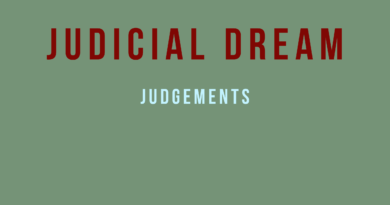SEC 372 CRPC
Joseph Stephen vs Santhanasamy, SC 2022
FACTS – That all the original accused were charged and tried for the offences punishable under Sections 147, 148, 324, 326, 307, 506(ii) r/w section 149 IPC.
The Chief Judicial Magistrate, Tiruchirapalli, by judgment in 2012, convicted the accused under the aforesaid offences except Sections 307 and 506(ii) IPC and thereby acquitted the accused under Sections 307 and 506(ii) IPC.
Feeling aggrieved and dissatisfied with the judgment and order of conviction passed by the Chief Judicial Magistrate, Tiruchirapalli, the accused preferred Criminal Appeal in 2012 in the Court of III Additional Sessions Judge, Tiruchirapalli. Challenging the acquittal of the accused under Sections 307 and 506(ii) IPC, the victims also filed Criminal Appeal 2012. The first appellate Court, in 2013 allowed the appeal preferred by the accused and acquitted the accused. The criminal appeals filed by the victims against acquittal of the accused under Sections 307 and 506(ii) IPC came to be dismissed.
Feeling aggrieved and dissatisfied with the common judgment and order passed by the first appellate Court allowing criminal appeal No. 92/2012 preferred by the accused, the victims – private respondents herein preferred criminal revision application in 2013 before the High Court under Section 397 r/w 401 Cr.P.C. By the impugned judgment and order, while exercising the revisional jurisdiction under Section 401 Cr.P.C., the High Court has set aside the judgment and order passed by the first appellate Court allowing Criminal Appeal in 2012 and acquitting the accused, and consequently has convicted the accused for the offences other than the offences under Sections 307 & 506(ii) IPC and has restored the judgment and order of conviction and sentence passed by the trial Court. The High Court has however modified the sentences imposed by the trial Court.
Feeling aggrieved and dissatisfied with the impugned common judgment and order passed by the High Court reversing the acquittal and thereupon convicting the accused, while exercising the revisional jurisdiction under Section 401 Cr.P.C., original accused nos. 6 to 8 have preferred the present appeals.
CAUSE – The High Court, in exercise of its revisional jurisdiction under Section 401 Cr.P.C., has set aside the order of acquittal passed by the first appellate Court and has convicted the accused.
ARGUMENTS – Shri S. Nagamuthu, learned Senior Advocate appearing on behalf of the accused has also relied upon the decision of this Court in the case of Mallikarjun Kodagali v. State of Karnataka, (2019) 2 SCC 752, by which the right of the victim to prefer an appeal against the order of acquittal has been recognised. It is submitted that as held by this Court, even in a case where the victim prefers an appeal against acquittal, he has an absolute right of appeal and therefore he is not required to even seek leave to appeal as required in case of “complainant” while preferring the appeal under Section 378(4) Cr.P.C.
ISSUE – Whether in a case where the victim has a right of appeal against the order of acquittal, now as provided under Section 372 Cr.P.C and the victim has not availed such a remedy and has not preferred the appeal, whether the revision application is required to be entertained at the instance of a party/victim instead of preferring an appeal?
DECISION – It cannot be disputed that now after the amendment in Section 372 Cr.P.C. after 2009 and insertion of proviso to Section 372 Cr.P.C., a victim has a statutory right of appeal against the order of acquittal. Therefore, no revision shall be entertained at the instance of the victim against the order of acquittal in a case where no appeal is preferred and the victim is to be relegated to file an appeal. Even the same would be in the interest of the victim himself/herself as while exercising the revisional jurisdiction, the scope would be very limited, however, while exercising the appellate jurisdiction, the appellate Court would have a wider jurisdiction than the revisional jurisdiction. Similarly, in a case where an order of acquittal is passed in any case instituted upon complaint, the complainant (other than victim) can prefer an appeal against the order of acquittal as provided under sub-section (4) of Section 378 Cr.P.C., subject to the grant of special leave to appeal by the High Court.
As observed by this Court in the case of Mallikarjun Kodagali , so far as the victim is concerned, the victim has not to pray for grant of special leave to appeal, as the victim has a statutory right of appeal under Section 372 proviso and the proviso to Section 372 does not stipulate any condition of obtaining special leave to appeal like sub- section (4) of Section 378 Cr.P.C. in the case of a complainant and in a case where an order of acquittal is passed in any case instituted upon complaint. The right provided to the victim to prefer an appeal against the order of acquittal is an absolute right. Therefore, so far as this issue is concerned, namely, in a case where the victim and/or the complainant, as the case may be, has not preferred and/or availed the remedy of appeal against the order of acquittal as provided under Section 372 Cr.P.C. or Section 378(4), as the case may be, the revision application against the order of acquittal at the instance of the victim or the complainant, as the case may be, shall not be entertained and the victim or the complainant, as the case may be, shall be relegated to prefer the appeal as provided under Section 372 or Section 378(4), as the case may be.
Now the next question is what order should be passed in a case like the present. This Court may either set aside the impugned judgment and order passed by the High Court setting aside the acquittal and convicting the accused so as to enable the High Court to remit the matter to the first appellate Court to rehear the appeal after considering the findings recorded by it or to remit the matter to the High Court to treat the revision application as a petition of appeal against the order of acquittal, which otherwise is permissible under sub-section (5) to Section 401 Cr.P.C.
However, considering the fact that even otherwise being victims they are having the statutory right of appeal as per proviso to Section 372 Cr.P.C., we deem it fit and proper to remit the matter to the High Court to treat the revision applications as petition of appeals under Section 372 Cr.P.C. and to decide the same in accordance with law and on their own merits. The same would be in the interests of all, namely, the victims as well as the accused, as the appellate Court would have a wider scope and jurisdiction as an appellate Court, rather than the revisional court.




